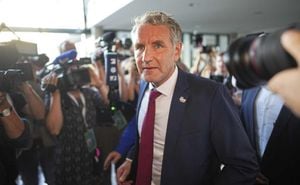The 2023 German Parliamentary Elections took place on February 23, marking a significant moment in the country's political history as voters turned out to elect new representatives for the Bundestag. According to exit polls, the Christian Democratic Union (CDU) emerged victorious, securing approximately 29 percent of the votes. This victory aligns with recent polling trends, which had consistently placed the CDU at the forefront. Close behind was the right-wing populist Alternative for Germany (AfD), garnering around 19.5 percent of the electorate, followed by the Social Democrats (SPD) under Kanzler Olaf Scholz, who received 16 percent.
With 59.2 million people eligible to vote, the elections were precipitated by the collapse of the coalition government led by Scholz, which included the Greens and the Free Democratic Party (FDP). This coalition fractured due to the dismissal of Finance Minister Christian Lindner from the FDP, diminishing the ruling coalition's majority. Subsequently, President Frank-Walter Steinmeier dissolved the parliament and called for expedited elections, initially slated for September 2025, to be held sooner.
Throughout the campaign, themes surrounding immigration and national security were especially prominent, propelled by several tragic incidents, including attacks attributed to immigrants. This shift saw the CDU adopt more hardline stances on immigration issues, with Friedrich Merz, the party's leader and chancellor candidate, advocating for stringent immigration controls.
Merz has openly criticized the current government’s management of immigration and has called for immediate bans on illegal migrants. His rhetoric has drawn both increasing support and significant condemnation, particularly from the left. Proponents, such as some conservative voters, view the CDU’s migration policies as necessary to bolster national security. Others, particularly left-leaning voters, express alarm over the AfD's rising influence, fearing it could jeopardize democratic values. One voter encapsulated this sentiment by stating, "The AfD has rhetoric from the 1930s, and I don’t want history to repeat itself." Another noted the necessity of maintaining secure borders but expressed concern about the treatment of foreigners living within Germany.
Polling data prior to the elections indicated fragmentation within the electorate, with around 20 percent of voters undecided about their preferred candidates up to the final days of campaigning. While the CDU appeared to gain ground, the left-wing parties struggled to solidify their bases. The Greens garnered approximately 13 percent of the votes, closely trailed by the leftist party The Left, which received around 8.5 percent. The FDP fell below the five percent threshold, reflecting the growing challenge for centrist and left-leaning parties to connect with voters disillusioned by traditional policies.
Notably, these elections represented not just political contests, but contests of ideologies, reflecting deep societal rifts. Voter turnout was reported at 52 percent by midday, increasing from previous election years, with peaks observed particularly among younger voters concerned about rising extremism. According to one young voter, "It’s dangerous to see parties like AfD getting this much support. We need leaders who bring people together, not divide them." Conversely, supporters of the AfD maintain their stance was built upon the failures of mainstream parties to address issues affecting their constituents.
Friedrich Merz, insisting he is prepared to lead Germany forward, stated his intention to form alliances based on shared values, rejecting collaborative efforts with the AfD as he aims to position the CDU as the pillar of stability. Yet, divisions remain significant. The discussion of potential coalitions looms large as the CDU considers alliances primarily with the SPD, the Greens, or other parties, particularly as they distance themselves from previous government policies.
After the results were announced, discussions about coalition forming began immediately, with Merz expressing urgency to establish government before the upcoming Easter holidays. This reflects the traditional German preference for coalition-building, ensuring stability within the government amid rising public demands for decisive leadership.
More than just electoral reconfigurations, these elections represent Germany's grappling with its national identity, governance challenges, and the balancing act of democratic principles against populist sentiments. Following the election, potential future coalitions will be heavily influenced by ideological divides, challenges of governance, and the necessity for effective leadership, particularly as Germany navigates its role within Europe and global dynamics.
Over the next few months, as coalition negotiations take place, the nation will watch closely to see how these new developments will shape both its domestic policies and international relations. The stakes couldn't be higher, as the way forward for Germany hangs precariously on the outcomes of these discussions and the leaders who will be entrusted with the country’s future.



